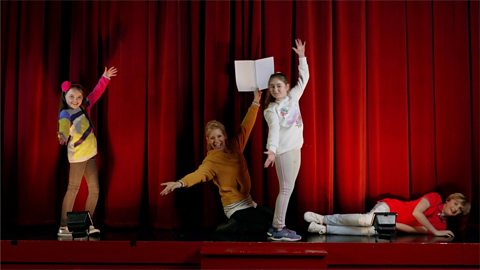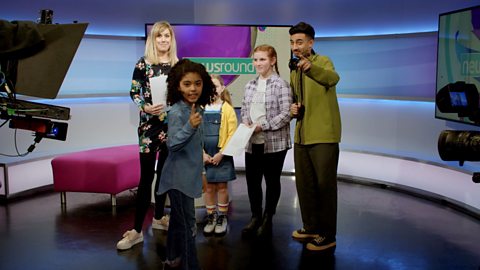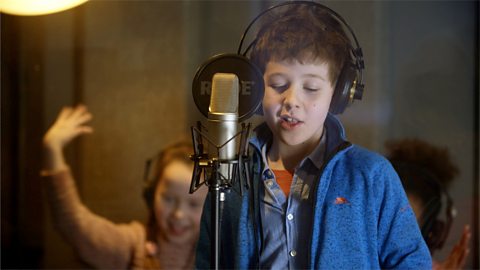Naomi: Hi, I’m trying to pick a card for my friend’s birthday.
Naomi: Its so hard! I can't decide if I prefer this one…
Naomi: 'Your birthday is a day to do exactly as you please, its your day, you call the shots so spend it at your ease.'
Naomi: Or maybe this one, Flappy birthday! Its funny, but its not really what I need!
Naomi: I'm looking for a card that puts into words how I feel about my friend, and lots of these cards use poems to express feelings.
Naomi: Poetry is a really great way of putting into words the things that we hardly ever say in everyday life.
Naomi: For example, when was the last time you said to your Mum…
Naomi: 'I thank my lucky stars for you and all the caring things you do.'
Naomi: Other cards use playful poetry…
Naomi: 'You really are fantastic, its something you can't stop, in the awesomeness awards, you always come out top!'
Naomi: You might not have thought about it before, but there are people whose job is to write poems for cards.
Naomi: They use their creativity to dream up all the words that the rest of us want to say.
Naomi: Wish I could do that today… well here is someone who will definitely be able to help me out!
Naomi: Joseph Coelho is an award winning performance poet!
Joseph: Writing poems can be a fantastic way to play words, language and to have a bit of fun.
Joseph: There are loads of ways that language to enhance your writing.
Joseph: You can use language for effect with poetic devices like onomatopoeia, rhyme, assonance, alliteration.
Joseph: These devices are also fantastic ways of expressing your emotions, how you feel inside.
Joseph: When the sun is bright, I feel alright.
Joseph: But when the baking clouds are loud, they make my tears fall down.
Joseph: My challenge for you is to write a poem for a greetings card. It can be for anyone so you can get as creative as you like.
Joseph: Just remember to have fun.
Joseph: Alright, get creative!
Naomi: Playing with language! Sounds like fun! So who’s going to be taking on this challenge then?
Naomi: First up, its Tori and her super powered imagination makes her feel like she can fly!
Naomi: Next, its Jess who is super stretchy! How does she get her leg up there?
Naomi: Finally, we've got Pearce, who has an amazing painting finger!
Naomi: Right guys what do you think of this challenge then?
Pearce: Does it have to be a serious poem or can it be funny?
Naomi: Well, that’s up to you – it depends who your card is for and what you might like to say.
Naomi: I've brought along a few cards here. Read the poems in there and that might give you some inspiration.
Naomi: And while you have a look at those, here are some things you'll need…
Naomi: A pen or pencil…
Naomi: Some paper…
Naomi: And some cards for inspiration!
Naomi: Right then, are you ready to start your challenge?
Children: YEAH!
Pearce: Okay then! Let’s get creating!
Naomi: Oi! That’s my line!
Naomi: Ok then! Let’s get… well I don't need to say it now, you've said it.
Naomi: Do you all have an idea of what you want to do for your greetings cards?
Naomi: What's your plan, Jess?
Jess: I'm going to do an acrostic poem.
Naomi: What's an acrostic poem?
Jess: Say you were doing friend, you put down the word friend, for 'F' you would do 'fun', for 'R' you would do respectful…
Naomi: I see, so you do a word for every letter you've written in that column.
Naomi: Good idea! Alright, what are you going to do?
Pearce: I'm going to write a silly and sarcastic poem for my mum!
Naomi: Does that sum you up?
Pearce: Yep!
Naomi: And Tori?
Tori: A silly poem for my sister!
Naomi: Nice! OK, should we get started then? Lets do it!
Naomi: Try using words that have similar sounds, or start with the same letter!
Naomi: Use an image to describe a thought or feeling. Don't forget that the rhythm of the poem is important too!
Naomi: Are we all done? I think we are. Who would like to share their poem with us?
Naomi: All of you? Who would like to start?
Pearce: My mum plays piano and I like to sing along when I do something bad she tells me I'm in the wrong.
Pearce: I think you're really fun, especially when you run, there's nothing better than a day out with you in the sun!
Naomi: If you enjoyed this challenge there are loads more over on the BBC Teach website.
Naomi: You can write a script, tell a story or design a costume.
Naomi: So go on, get creative!
Video summary
Presenter Naomi Wilkinson and a group of children gather in a greetings card shop and, using the cards for inspiration, are challenged to write a poem for someone they know.
Our ‘Master’ poet, Joseph Coelho, adds another level to the challenge by inviting children to incorporate language used for effect (i.e. rhyme, alliteration, onomatopoeia, assonance).
Working as a group, the children create their poems and perform excerpts at the end of the film.
This short film is from the BBC series, Get Creative.
Teacher Notes
Before watching
Bring into class a selection of greetings cards with poems in them (or have the children collect them in as part of homework).
Talk to your pipils about when they receive cards and ask if they’ve ever had one with a poem in it.
Read from the cards and try to guess what occasion/family member they are for. Have pupils read poems from a selection of cards.
They might want to share their favourites by reading aloud (reading poetry aloud is a great way to develop an ear for language).
After watching
Tell the children they are going to write a poem for a greetings card for someone they know, like in the video.
Give them a moment to decide who to write to.
Then give them five - ten minutes to note down some ideas for their card. (You may want to use some or all of the Thinking Questions below to help guide them).
Give the children some time to write their poems.
Depending on the ability and age of your pupils, go for 5-20 lines of poetry. For a further challenge – you can include the ‘Master Skill’.
Master Skill
- Using language for effect – possible language to include: rhyme, alliteration, assonance, onomatopoeia, puns.
Find examples of each to share with children and encourage them to pick one to try out in their own poems.
You may want to plan a focused skills lesson to incorporate this, or just challenge the children to the task.
Show them how to turn a normal line or two into a rhyming line…You’re always there for me when I come home.I love you mum, you’re beautiful, wise and funny.
Rhyme:
I love you mum,You’re always there,
You’re wise and fun,You always share!
Or how to add alliteration:
You’re a merry mummy,
mirthful and mischievous.
Pretty as a petal of a pink petunia.
Onomatopoeia:
You’re always there when I get home
You listen when I want a moan
And whisper reassuring words
That ring with love and real concern.
Pun:
Mum, you really are great at everything – you’re Opti-mum!
Mum, thank you for these fabulous jeans.
Thinking Questions
- What reaction do you want from the person who reads the card (make them smile, laugh, feel good about themselves)?
- What details can you include to make the card/poem really personal?
- What do I like most about this person?
- What is special about this person?
- What is funny about this person?
- What does this person make me feel?
- What do I want to make this person feel?
Supported Learning and SEN
Poetry can be a daunting prospect for children who struggle with the written word. There are many ways you could adapt this project to make it more accessible, here are a few ideas:
Give support
- Complete this task as a piece of shared writing
- Have an adult or more abled peer support the writing
Adjust challenge level
- Reduce the amount of lines
- Remind children that poems don’t have to rhyme
- Suggest an acrostic poem as an easier introduction to poetry
Use the example cards
- As a template to work from, children could change a few words to suit their purpose
- Students could choose lines they like and copy or cut them out to create their own compositions
Make it oral
- Have the children compose the work orally, in a pair, a group or individually
- Use technology to record the poems – a voice card/video card
- Or have an adult/peer write down their words
Extend this Activity
- Turn this into an art and design lesson, by creating illustrations for the cards.
- Create a class anthology of poems.
- Publish your poems on the school website.
- Perform the poems in an assembly or for a school event.
- Record your poems and make short films to accompany them.
Curriculum Notes
This short film is designed to support the teaching of creative writing for KS2 in England, Wales, Northern Ireland and for 2nd level in Scotland.
In England the video offers a chance for pupils to write with purpose in context, using the skills of notation and editing whilst also providing the opportunity to read work aloud and work towards mastery through developing specific key skills.
In Wales the video provides an opportunity for pupils to write creatively with chances to adapt their writing for purpose, use a range of language skills, note ideas and plan their writing then reflect, redraft and improve their work.
In Northern Ireland the video gives pupils the opportunity to participate in independent or group writing, select, plan and adapt their writing for purpose, express thoughts and feelings through their imaginative compositions, experiment with language and practise the skills of revising and redrafting their compositions.
In Scotland the video presents pupils with an example of contextual writing to explore, from which they can create their own pieces of writing from notes, use appropriate vocabulary, language and style to engage their reader and check their writing for sense and purpose.
Write a script. video
Naomi Wilkinson challenges a group of children to write a short script for a TV show.

Create a story. video
A visit to the Newsround studio presents real-life context for telling a story and a challenge for children to tell a story as a short news report.

Write song lyrics. video
Karim Zeroual and a group of children take on the challenge of writing their own song lyrics.
